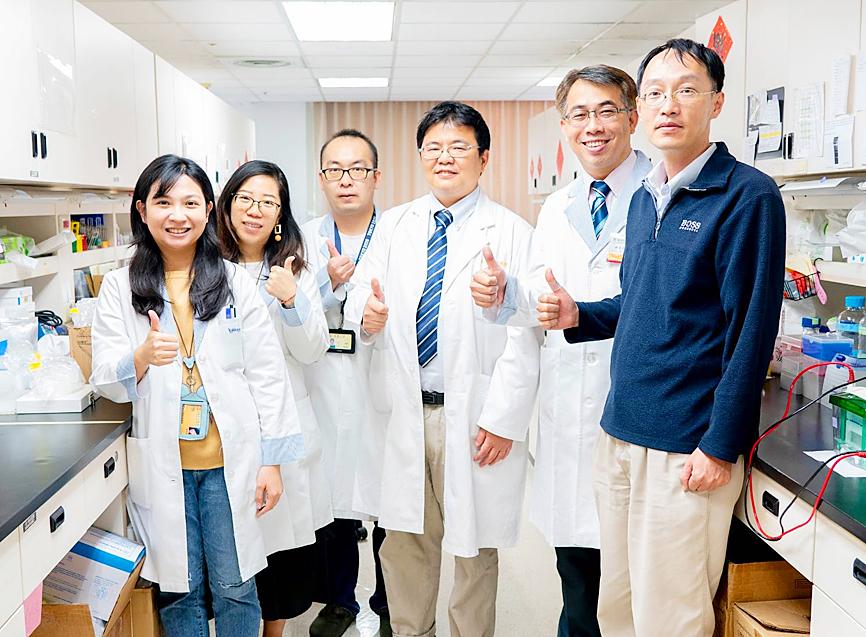Researchers have identified an antioxidant in locally grown black tea leaves as a potential inhibitor of protease activity in SARS-CoV-2, the virus that causes COVID-19, Chiayi Chang Gung Memorial Hospital said on Wednesday.
A research team led by Wu Ching-yuan (吳清源), head of the hospital’s Department of Traditional Chinese Medicine, used a computer program to identify potential antiviral components in traditional plants, the hospital said in a statement.
Theaflavin, a polyphenolic compound, shows broad-spectrum antiviral activity against several viruses and could be used as a lead compound for the development of a SARS-CoV-2 inhibitor to target the DNA-directed ribonucleic acid (RNA) polymerase (RdRp) enzyme.

Photo copied by Lin I-chang, Taipei Times
In coronaviruses, RdRp catalyzes the replication of RNA from a template, making it an attractive candidate to help develop a treatment, Wu said.
RdRp in SARS-CoV-2 is also a primary target for the antiviral remdesivir, which the WHO has called the most promising drug available for the treatment of COVID-19, he said.
Remdesivir works by inhibiting RdRp, which many RNA viruses — including coronaviruses — use to replicate themselves.
The antiviral effects of theaflavin are similar to those of remdesivir, Wu said.
However, the exact in vivo effect is still unclear, and further research is needed to confirm the mechanism whereby theaflavin targets SARS-CoV-2, Wu said.
The findings were published by the American Society for Microbiology in the Journal of Medical Virology on March 13, the hospital said.
In other news, the Central Epidemic Command Center (CECC) on Thursday said that quinoline antimalarial drugs, which have been discussed as a possible treatment for COVID-19, are produced in Taiwan and could be made available if testing proves them to be effective against the novel coronavirus.
In a small French study, doctors used a drug in the quinoline family — hydroxychloroquine — to reduce the duration and severity of COVID-19 symptoms in people with mild cases, said Chang Shan-chwen (張上淳), convener of the center’s expert advisory panel.
If properly tested and approved, a process that normally takes 12 to 18 months, the drug could conceivably reduce the burden on medical resources such as quarantine facilities, Chang said.
Minister of Health and Welfare Chen Shih-chung (陳時中), who heads the CECC, said that there is one manufacturer of quinoline drugs in Taiwan.
If the treatment were proved to be viable, the government’s first priority would be to guarantee domestic supply, Chen said.
The government could participate in the distribution of the drug on the precondition of not harming the manufacturer’s commercial interests, Chen said.
Internationally, drug distribution rights could be used diplomatically to build ties with international partners to address shortages amid the pandemic, he said.
Drugs that have been touted as potentially effective against COVID-19 have become the subject of heated competition in the past few weeks as governments scramble to combat the disease.
Remdesivir is being used on a trial basis in Taiwan and has reduced fevers in the three COVID-19 patients who have been treated with it, although its effect on overall recovery time is still being studied, Chang said.

The manufacture of the remaining 28 M1A2T Abrams tanks Taiwan purchased from the US has recently been completed, and they are expected to be delivered within the next one to two months, a source said yesterday. The Ministry of National Defense is arranging cargo ships to transport the tanks to Taiwan as soon as possible, said the source, who is familiar with the matter. The estimated arrival time ranges from late this month to early next month, the source said. The 28 Abrams tanks make up the third and final batch of a total of 108 tanks, valued at about NT$40.5 billion

Two Taiwanese prosecutors were questioned by Chinese security personnel at their hotel during a trip to China’s Henan Province this month, the Mainland Affairs Council (MAC) said yesterday. The officers had personal information on the prosecutors, including “when they were assigned to their posts, their work locations and job titles,” MAC Deputy Minister and spokesman Liang Wen-chieh (梁文傑) said. On top of asking about their agencies and positions, the officers also questioned the prosecutors about the Cross-Strait Joint Crime-Fighting and Judicial Mutual Assistance Agreement, a pact that serves as the framework for Taiwan-China cooperation on combating crime and providing judicial assistance, Liang

A group from the Taiwanese Designers in Australia association yesterday represented Taiwan at the Midsumma Pride March in Melbourne. The march, held in the St. Kilda suburb, is the city’s largest LGBTQIA+ parade and the flagship event of the annual Midsumma Festival. It attracted more than 45,000 spectators who supported the 400 groups and 10,000 marchers that participated this year, the association said. Taiwanese Designers said they organized a team to march for Taiwan this year, joining politicians, government agencies, professionals and community organizations in showing support for LGBTQIA+ people and diverse communities. As the first country in Asia to legalize same-sex

MOTIVES QUESTIONED The PLA considers Xi’s policies toward Taiwan to be driven by personal considerations rather than military assessment, the Epoch Times reports Chinese President Xi Jinping’s (習近平) latest purge of the Chinese People’s Liberation Army (PLA) leadership might have been prompted by the military’s opposition to plans of invading Taiwan, the Epoch Times said. The Chinese military opposes waging war against Taiwan by a large consensus, putting it at odds with Xi’s vision, the Falun Gong-affiliated daily said in a report on Thursday, citing anonymous sources with insight into the PLA’s inner workings. The opposition is not the opinion of a few generals, but a widely shared view among the PLA cadre, the Epoch Times cited them as saying. “Chinese forces know full well that